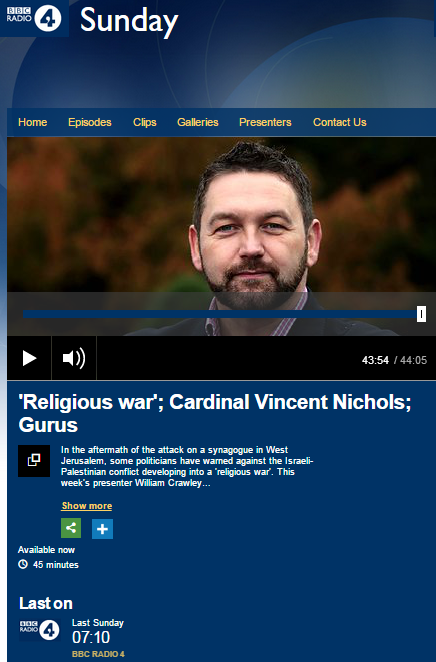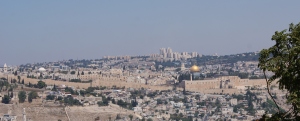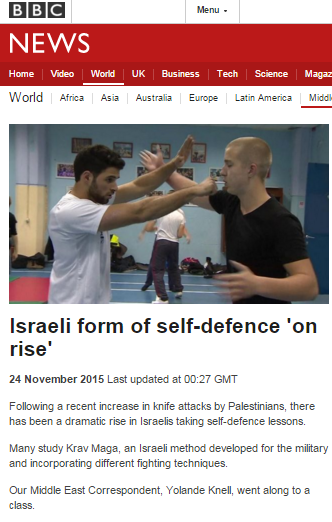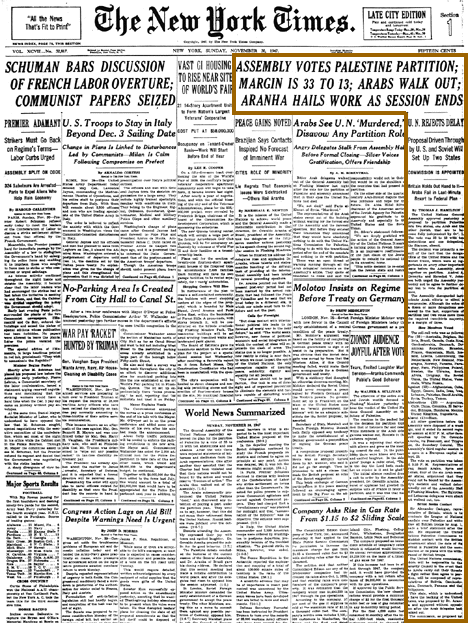On November 23rd the BBC Radio 4 programme ‘Sunday’ – which claims to address “the religious and ethical news of the week” – included an item (available from 36:45 here) presented in its synopsis as follows:
“In the aftermath of the attack on a synagogue in West Jerusalem, some politicians have warned against the Israeli-Palestinian conflict developing into a ‘religious war’. This week’s presenter William Crawley examines the latest wave of violence in the region. We also hear from Cardinal Vincent Nichols who has spent the last week on pilgrimage in the Holy Land.”
William Crawley introduced the item thus:
“On Tuesday two young Palestinian men armed with a gun, knives and meat cleavers went on a killing spree in a Jerusalem synagogue, leaving four rabbis and a police officer dead in their wake. Murder and brutality are tragically commonplace in the continuing Israeli-Palestinian conflict and atrocities have been committed by both sides. But the unavoidable conclusion to be drawn about Tuesday’s attack, in the judgment of the Israeli Justice Minister, is that this conflict over land rights and political identity is now poised to become a full-blown religious war. We’ll explore that claim in a moment.”
After a conversation with Cardinal Vincent Nichols in which the professed subject matter was not ‘explored’, Crawley (at 40:34) moves on to his next guest.
“The Cambridge University historian Dr Wendy Pullan is the author of ‘The Struggle for Jerusalem’s Holy Places’. Wendy – good morning to you.”
Dr Pullan’s title could have more accurately been presented to listeners as “Senior Lecturer in the History and Philosophy of Architecture“. Significantly, she is also the “principal investigator” at “Conflict in Cities and the Contested State” (a body funded by the ESRC) which, despite its broad title, focuses its attentions mainly upon two cities: Jerusalem and Belfast. Past readers of the Guardian may be familiar with the Israel-related political opinions of Wendy Pullan’s “Conflict in Cities” colleague Mick Dumper and Dr Pullan is apparently also not averse to co-opting the halo of ‘impartial’ academia in order to promote a political narrative, as can be seen in her signed support for the BDS campaign at her university and, for example, her erroneous claim in an article published at ‘Open Democracy’ in 2013 that Israeli construction in the area known as E1 near Ma’ale Adumim “would cut the West Bank in two”. That inaccurate claim was also repeated in a paper presented by Pullan in Ankara in May 2014 within the framework of the UN’s “International Year of Solidarity with the Palestinian People”, in which the anti-terrorist fence constructed to curb suicide bombings and thus save Israeli lives was described by Pullan in the following words:
“In recent years the world has been transfixed by the extent and audacity of the separation barrier (wall). While not to diminish the extent of the human misery the wall has caused the Palestinians, it is worth noting that this structure is only part of a much larger system that keeps the occupation in place, resulting from harsh closure policies that have cut off Palestinian Jerusalem from its natural hinterland in the West Bank. Effectively, the wall is a very visible ‘tip of the ice-berg’. Although the introduction of an eight-metre high wall that separates mostly Palestinians from Palestinians is a shocking spectacle repeatedly used in the media, we know from Berlin that walls can come down.” [emphasis added]
The conversation which took place in the Radio 4 programme is therefore best taken in the context of Wendy Pullan’s obvious political motivations. They, however, were not revealed to the programme’s listeners – in breach of BBC Editorial Guidelines on impartiality.
Crawley: “Let’s go to this claim of a developing religious war; to what extent to you buy into that analysis?”
Pullan: “Ahm…I don’t buy into it in the way it’s being portrayed by the various political leaders and then picked up by the press. I think that religion has played a role in this conflict for many decades but its role is not particularly new at this point.”
Crawley: How do we separate out a conflict with religious dimensions from a religious war? What’s the definition of that?”
Pullan: “Ahm…I think that the many different aspects to this conflict that have a lot to do with national identity and a very prolonged occupation and that these will always figure in the conflict itself. It’s over land, it’s over rights, it’s over identity. Now religion obviously has a role in all of that but I don’t think it’s the only role. Whereas a religious war will normally be fighting only in the name of religion; where all of the other aspects just fall by the wayside.”
Crawley: “So you’re calming down the rhetoric but let’s come to Jerusalem – a city you know very well; you lived there yourself for thirteen years. That city is so key to the peace process at this point. Why is it always such a sticking point?”
Pullan: “Well it’s a sticking point because it’s coveted by many different groups of people. And the…in a lot of ways the occupation comes to a head there. Jerusalem is highly symbolic. I mean when I say this isn’t a religious war, it doesn’t mean that religion is unimportant. It is the centre for three major monotheistic faiths. So it’s the natural place to play out the conflict. On the other hand, it’s coveted as a capital for both the Palestinians and the Israelis.”
Crawley: “And the fact that it has so many sacred sites is significant because sacred sites don’t cease to be sacred for future generations.”
Pullan: “No, the sacred sites…once a sacred site is numinous it usually continues to be numinous and certainly the area that the Jews know as Temple Mount and the Muslims know as Haram al Sharif is an area that’s gone back and forth in different hands and so on. But it’s remained holy, although this has been manifested in different sorts of ways.”
Crawley: “Very briefly, Wendy, what do you think it would take to calm down some of these tensions at the minute?”
Pullan: “Ahm…I think it needs political savvy and sensitivity. I mean one of the things that we find over the years in Jerusalem is that political expression for a long time was not tolerated. Religious expression was.”
The conversation ends there, but obviously the take away message for audiences is that there is no need to worry about a religious war in the context of the Arab-Israeli conflict. That clearly erroneous conclusion ignores both history and current events, as Dr Jonathan Spyer noted in a recent article well worth reading in full.
“An oft-repeated sentiment currently doing the rounds in discussions of the Israeli-Palestinian issue is that it is imperative that the conflict not become a “religious” one. This sentiment, guaranteed to set heads nodding in polite, liberal company, stands out even within the very crowded and competitive field of ridiculous expressions of historical ignorance found in discussion of the Israeli-Palestinian issue.
This sentiment is connected to the recent wave of terror attacks in Jerusalem, which are the result of Palestinian claims that Israel is seeking to alter the “status quo” at the Temple Mount. As this theory goes, up until now this conflict had mainly been about competing claims of land ownership and sovereignty, but it is now in danger of becoming about “religion,” and hence turning even more intractable. So this must be prevented.
In objective reality, the conflict between Jews and Arab Muslims over the land area between the Jordan River and the Mediterranean Sea has been, from its very outset, inseparable from “religion”.”
So why did a religious affairs programme on BBC Radio 4 seek to brush aside the veteran religious component in the Arab-Israeli conflict? Well, clearly one answer to that may be that the promotion of a ‘black and white’ political narrative of the kind advanced by Dr Pullan and her colleagues becomes significantly more complicated if Western audiences are informed of the conflict’s religious dimensions.




